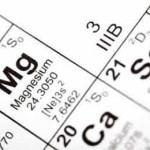Does Magnesium Help Lower Blood Pressure?
When it comes to lowering blood pressure (BP), potassium may be the most essential mineral that is needed by your body. Many studies have confirmed the effectiveness of potassium to help treat hypertension (high blood pressure). But don’t forget, potassium doesn’t work alone. Magnesium is another important mineral. Though there is still no clearly scientific evidence to explain the role of this mineral in helping to control BP, but some studies found that it may also help prevent and treat hypertension.
It is one of the most essential electrolytes needed by the body. And in the body, it is commonly found in the body’s cells and in the bones. But it also can be found in the bloodstream – though only in very small amounts.
Therefore, sometime a blood test to measure the amounts of magnesium (Mg) in the blood is needed to find out the cause of certain health condition. How about its primary functions?
 In general, it is needed by your body to help support some mechanisms in the transmission of your nerves, provide proper muscle function (particularly for muscle contraction), and also important to help activate some enzymes.
In general, it is needed by your body to help support some mechanisms in the transmission of your nerves, provide proper muscle function (particularly for muscle contraction), and also important to help activate some enzymes.
Furthermore, it also helps improve the health of your body immune system. It is often needed to help produce energy (magnesium can help mobilize fat and carbohydrate to make energy) – and also needed to move other essential electrolytes such as sodium and potassium ‘into & out of your body’s cells’.
Some experts believe that eating plenty of dietary magnesium and potassium along with diet high in fiber (particularly from vegetables and fruits on a regular basis) and diet low in salt & saturated fats can work effectively to help improve the BP levels.
There are some studies found that magnesium may help prevent and treat hypertension.
According to an article published in the official site of University of Maryland Medical Center, a large clinical research that involved about 8,500 women showed that those who took higher consumption of dietary Mg got lower blood pressure.
This suggests that higher intake of dietary Mg may have contribution to help reduce the risk of hypertension. Other studies also found almost the same result – though there are also few studies showed the different results.
Unfortunately while some studies have confirmed that there may be a link between lack of dietary Mg and the high risk of hypertension, but experts are still not able to clearly explain about how this mineral helps lower BP.
In fact, many foods high in magnesium is also rich in potassium – this is one thing that can make difficult to specifically analyze the effect of dietary Mg on the BP.
The following are some of the reasons that may answer the question.
The heart rhythm can vary throughout the day, because it can respond what you are doing. For instance, your heart can beat faster during exercise in order to distribute more oxygen through blood to the cells of your muscles.
But when your heartbeats run faster while it is not needed or due to unknown reason, this can be a problem. The abnormal condition of heart that beats too slow /too fast that can cause irregularly beats is medically called as heart arrhythmias.
While hypertension can cause arrhythmias, irregularly heartbeats also can make the levels of blood pressure fluctuate abnormally.
And since magnesium is needed for muscle contraction, experts think that it may also be essential to help stabilize the heart rate and prevent heart arrhythmia.
When your heart can work effectively, your BP is also more likely to keep normal and not easier to fluctuate ineffectively.
Poor blood sugar control often cause high blood pressure in diabetic people (see also more detailed information about the link between sugar and blood pressure in this section).
Having chronic high blood sugar can increase the blood cholesterol and put you at high risk of developing chronic kidney failure (a health condition that ranks at top cause of secondary hypertension).
Some studies found that magnesium may help decrease the risk of type-2 diabetes. And in people with diabetes, this mineral may also help improve the insulin sensitivity and blood sugar control.
Diet low in sodium (salt) is one of effective ways to help improve the balance of sodium in the blood and cells of your body. Excessive sodium in the body is bad for your systolic and diastolic pressures because it can directly affect your BP.
Therefore, diet low in salt or even free of salt if necessary is often recommended in DASH ‘Dietary Approaches to Stop Hypertension’ diet.
But your body has its own mechanism to help control the balance of all electrolytes in your body. And when it comes to the balance of sodium, your body needs plenty of potassium.
Potassium can help reduce the amounts of sodium in the cells of the body. But it doesn’t work alone – as noted before.
Potassium requires plenty of magnesium to open the membrane of cell for its entrance. In other words, without magnesium, potassium can be almost useless because it cannot cross the cell membrane to remove excessive sodium. So you need both minerals!
Now you know that it’s important to get plenty of magnesium in the diet. But how much you need to get it per day? The answer is dependent on your age and gender. Some certain conditions such as pregnancy and breastfeeding (lactation) also have an effect.
Below is a table of RDA ‘Recommended Dietary Allowance’ for magnesium (source: Institute of Medicine – Food and Nutrition Board):



